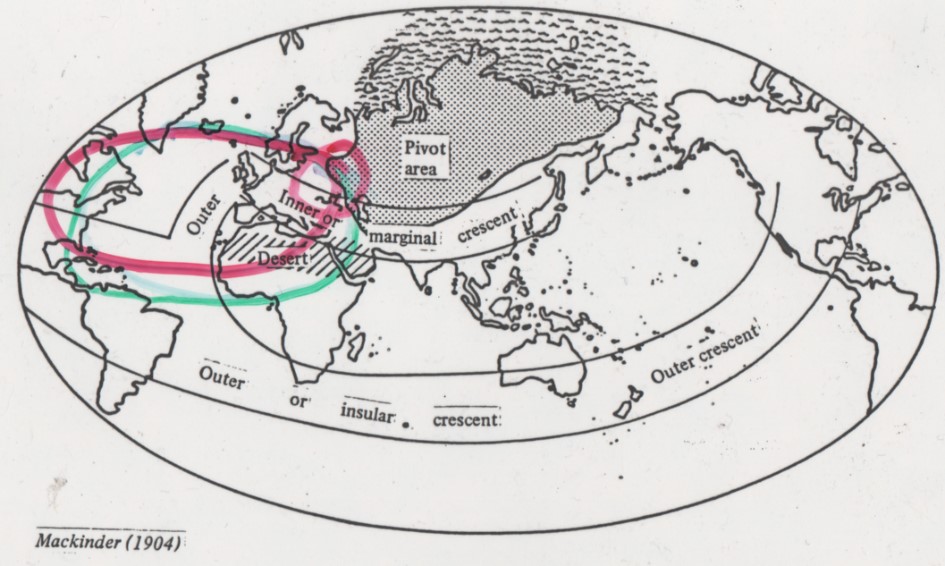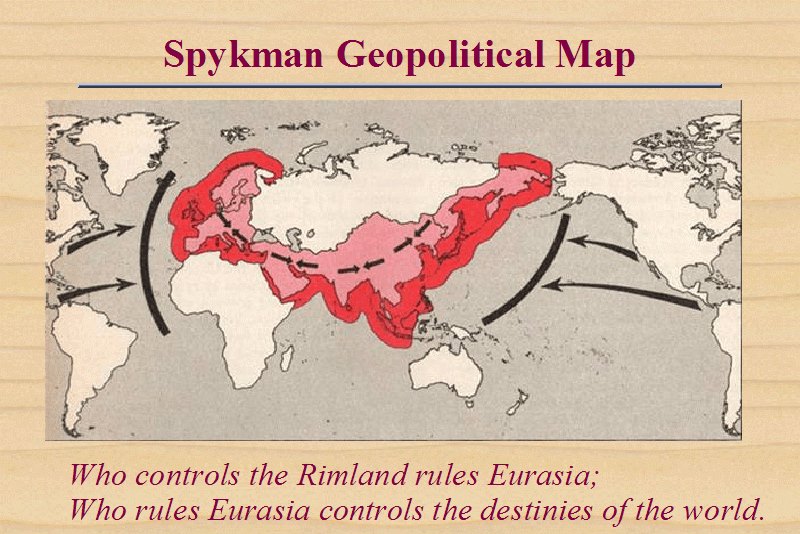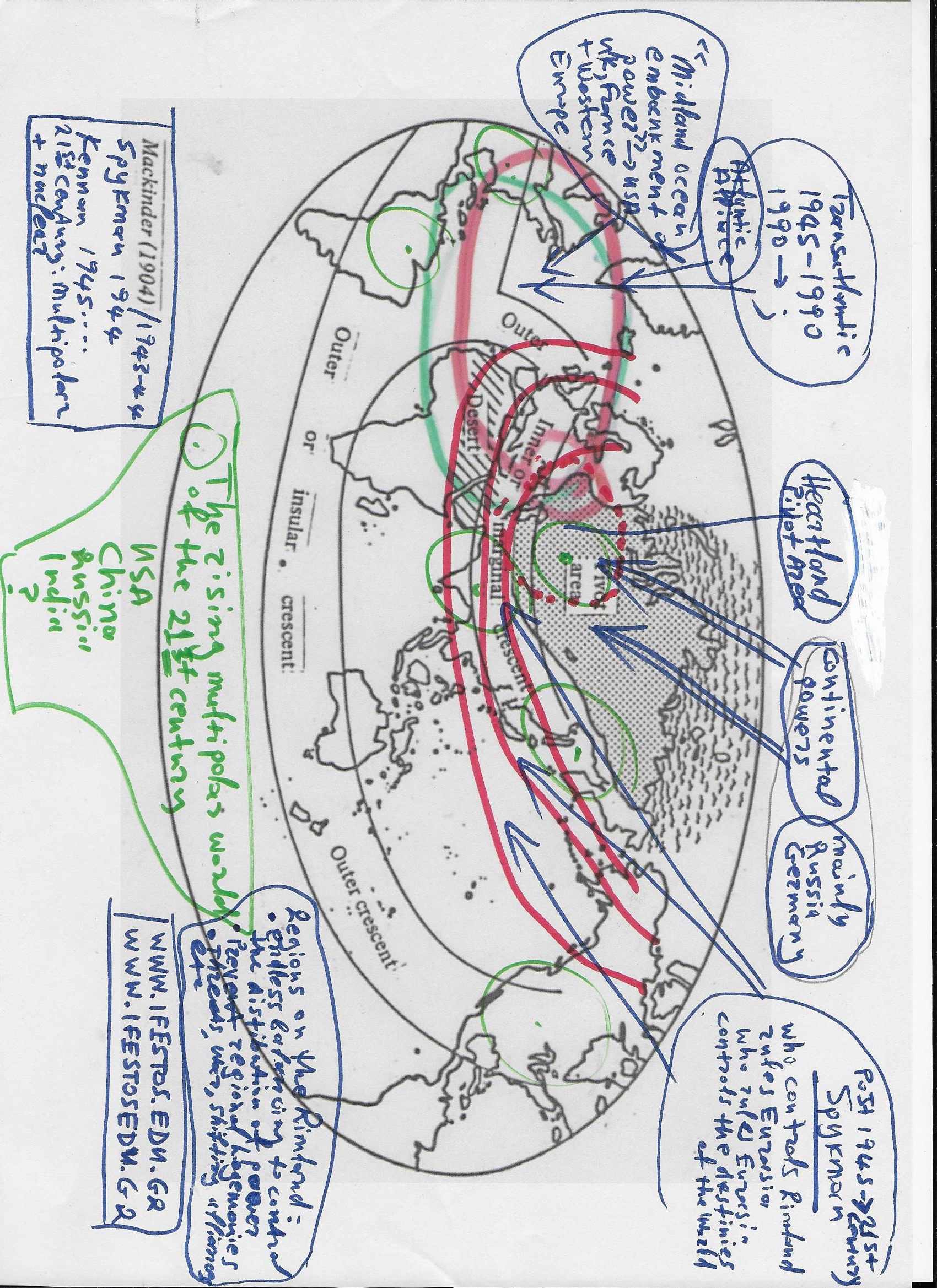 basically
unchecked.
basically
unchecked.INTERNATIONAL RELATIONS IN TIME AND IN SPACE. STRUCTURES, FUNCTIONS, ORIENTATIONS
|
DIACHRONIC STRUCTURE AND FUNCTIONS OF THE INTERNATIONAL SYSTEM AND ITS ONTOLOGICAL FOUNDATIONS |
|
3000 BC -1648 μ.Χ. |
||
|
Þ existential social alterity ( among the many societies at the world level Þ
|
Empire claims versus claims of collective freedom-sovereignty |
Ü claims for collective freedom-sovereignty (ontologically categorem) Ü
|
¯
|
1648 p.C. – 19TH-20ΤΗ century: BALANCE OF POWER SYSTEM, RISE INTO EXISTENCE OF THE NATION-STATE SYSTEM AND INTERNATIONAL LAW – INTERNATIONAL INSTITUTIONS – IR ontology |
|
¯
|
CAUSES OF WAR AS INTERVENING VARIABLES BETWEEN INTERNATIONAL LAW AND PEACE/STABILITY |
||
|
Þ Implementation of international law Respect of international rule of law Resort to use of violence Þ |
Û 1. Uneven growth in all its versions at both interstate and interregional level: economic, military, ideological, demographic, technological, territorial, discovery of world-producing resources. 2. Unequal distribution of power in combination with uneven growth cause hegemonic claims, hegemonic antagonisms, security dilemmas, revisionist claims or just claims for international change insusceptible to peaceful settlement often leading to threads to use violence and war. 3. Conflicts of the nation-building epoch. 4. Revolutionist claims and their supportive cosmopolitan utopian ideas which by definition run contrary to the ontologically founded –to the claims for freedom and alterity– nation state system and its international law. Causes inputs of irrationalism in intrastate and interstate politics 6. Revisionist states: those refusing to resort to international institutions for the interpretation of the differences over Treaties. 7. Transnational actors: terrorism, criminals, etc
|
Ü peace and stability, effective international institutions, international rule of law, growth of interstate conventions which strengthen the acquisitions of human political civilization at the international level Ü
|
Source: Π. Ήφαιστος, Οι διεθνείς σχέσεις ως αντικείμενο επιστημονικής μελέτης στην Ελλάδα και στο εξωτερικό. Διαδρομή, αντικείμενο, περιεχόμενο και γνωσιολογικό υπόβαθρο (Εκδ. Ποιότητα, Αθήνα 2004) σ. 114.
Fundamental distinction: Intrastate order and justice – interstate order
|
Principal features of intrastate characteristics and functions |
Principal features of interstate structures |
International law as it developed since Westphalia (1648) |
IR: Dialectics of many – few normative structures |
|
State structures founded on a distributive structure system and a political anthropology (ontology constructed in time and in space)
The viable states are characterized: Spiritual / Kosmotheoretical (worldviews) and moral alterity ontologically founded in time and in space We have Society, normative structures and viable governmental system
Normative structures and a legitimate political process that provides internal change
Relations among individuals and groups are governed: · By fundamental laws (Constitution) · By ordinary laws · By administrative institutions · By common laws and customary practices
|
Among nations: spiritual heterogeneity Interstate differentiation (anthropologically and as regards normative structures no one state is the same with any other)
At the level of the planet No world society No world government No world government of the governments No way to define what is justice among states (we only know what is order as defined by conventions)
Among states: unequal size, unequal wealth Unequal development Unequal economic growth Unequal power
Hegemonic behavior is a permanent feature of IR: “right exists if there is equal power and if this doesn’t happen the strong imposes his will and the weak adapts and retreats” In the best case states implement the agreements and in the worst case we have hegemony, conflict and war
|
The Westphalia regime of 1648: State sovereignty / national independence / political sovereignty are the foundation principles of modern interstate regime 1. interstate parity 2. no intervention 3. internal and external sovereignty 4. internal self-rule, self determination in accordance to each society’ s political-anthropological alterity Stability or instability are related with the causes of war. 1. Uneven growth in all its versions at both interstate and interregional level: economic, military, ideological, demographic, technological, territorial, discovery of world-producing resources. 2. Unequal distribution of power in combination with uneven growth cause hegemonic claims, hegemonic antagonisms, security dilemmas, revisionist claims or just claims for international change insusceptible to peaceful settlement often leading to threads to use violence and war. 3. Conflicts of the nation-building epoch. 4. Revolutionist claims and their supportive cosmopolitan utopian ideas which by definition run contrary to the ontologically founded –to the claims for freedom and alterity– nation state system and its international law. Causes inputs of irrationalism in intrastate and interstate politics 6. Revisionist states: those refusing to resort to international institutions for the interpretation of the differences over Treaties. 7. Transnational actors: terrorism, criminals, etc
|
Many rules: What this may mean? World government? World hegemony? Concert of hegemonic powers? What legitimization? What distributive justice system? To what society or societies they refer and what sociopolitical controls?
Few agreements In the best case: implementation of international rule of law, that is, conformity with what is provided in conventions and intestate agreements about international order In the worst case Hegemony Conflictual interpretation of agreements Double standards
|
Πηγή: Π. Ήφαιστος, Οι διεθνείς σχέσεις ως αντικείμενο επιστημονικής μελέτης (Ποιότητα), σ. 101
|
The contemporary system
|
||||||||||||||||||||||||
Πηγή: Π. Ήφαιστος, Οι διεθνείς σχέσεις ως αντικείμενο επιστημονικής μελέτης στην Ελλάδα και στο εξωτερικό (Εκδόσεις Ποιότητα, Αθήνα σ. 347.
Three situations three currents of thoughts and unlimited interconnections and interrelations: This is the international system
|
BALANCE OF POWER: inherently anti-hegemonic since balance checks hegemonic claims
Sovereignty –= anarchy -= endless management of power factors so as to have a distribution of power that it is conducive to stability Implement prerequisites of international order Defensive postures: check of revisionism Hegemonic/revisionist postures: control of other states, of resources and unwarranted changes of international order
Descriptive axioms: Περιγραφικό «Δόγμα»: «ο ισχυρός επιβάλλει ότι του επιτρέπει η δύναμή του και ο αδύναμος υποχωρεί και προσαρμόζεται» (και ο καθείς «ας κάνει ότι θέλει»):
1) Equilibrium through balance of power (defensive posture in accordance to Thucydidy’s axioms) 2) Hegemonic stability. Either one power or a concert of powers. Newliberalism
Balance of power theory. Source of contemporary international theory
Anti-hegemonic
· Contemporaty international law · Contemporary international institutions · Collective security · State sovereignty is the regime in our times is described in the Charter of the UN
|
COLLECTIVE SECURITY
Sovereignty = international anarchy.
Collective security: Institutions aiming at safeguarding international order as agreed in conventions and treaties
Βασικά: An attempt to keep international law through collective action.
Political principles. Sovereignty, internal and external Article 2 Ch. One of the UN
International governance: International institutions and when fail balance of power
International institutions. Are not supranational · Inefficient when big powers disagree · Impasse when the states in conflict disagree · Inefficient whenever the causes of war intervene. |
“World Authority”
Impossible except if hegemony
In conflict with societal alterity
Προσκρούει με σφοδρότητα: α)
Four versions
Empire Hegemonic Internationalist doctrines cosmopolitanism
|
Πηγή: Π. Ήφαιστος, Οι διεθνείς σχέσεις ως αντικείμενο επιστημονικής μελέτης στην Ελλάδα και στο εξωτερικό. Διαδρομή, αντικείμενο, περιεχόμενο και γνωσιολογικό υπόβαθρο (Εκδ. Ποιότητα, Αθήνα)
Panayiotis Ifestos, Professor, International Relations – Strategic Studies
University of Piraeus Greece, www.ifestosedu.gr -- www.ifestosedu.gr
----------------------------------------------------------------------------------------------------------
Anarchy (no government of governments and world government) is the regime as described in the Chapter of the United Nations
International regime of modern times:
· α) state sovereignty,
· β) High Principles of international law,
o Interstate parity
o Non intervention
o Internal and external sovereignty
o Peaceful resolution of conflicts
· c) collective security, …. Major issue which we should discuss
· δ) on-going process for international conventions regarding human rights, war crimes and crimes against humanity, international penal justice
Fundamental characteristics of the international system since Westphalia (Basically the system of the United Nations)
K. Waltz Theory of international relations
1. No world government or “Government of Governments”. Anarchic international system, a fact that influences state behavior considerably
2.
In
the international system no one governs legitimately therefore
antagonism and conflict is  basically
unchecked.
basically
unchecked.
3. States obliged to care for their security thus it is a self-help system
4. States are obliged to increase their power in order to be safe. Thus security dilemmas occur. Relative power and relative gains calculations feed the security dilemmas
5. States are the main actors of the international system. State-centric system. International organizations are dependent variables. Non-governmental organizations are either politically irrational actors (few on no social control) or dependent variables in the power struggle,
6. States are rational. Calculate costs and benefits of alternative postures and the cost – benefit impact. If not they pay a price
7. Fundamental national interests: survival, national independence: internal self-government
8. In international politics power is the main currency
9. States are balancing other states in order to secure their national interests, especially survival.
10. Balancing and counterbalancing makes the international system a self-regulated system. [and redistributes roles, position and interests in power terms]
John Mearsheimer, The Tragedy of Great power politics
Fundamental postures of big states in history (he studied since the Napoleonic wars hitherto) (Η τραγωδία της πολιτικής των μεγάλων δυνάμεων – Εκδόσεις Ποιότητα)
Permanent features of Big power Postures
World is condemned to perpetual great-power competition
· Absence of central authority cause states to fear one another
· States, especially big have always offensive capabilities
· States can never be certain about other states intentions
· The only guarantee for survival is if it would have been possible to be a hegemon, something that is unattainable
· Tragic: Great powers that otherwise have no reason to fight each other –they are merely concerned with their survival– have little choice but to balance each other endlessly
· Western type democracies mind for their security as much as other states
· Great powers’ aim: Maximize their share of world power
o Ultimate goal to become the only world hegemon. The ultimate condition of (unattainable) security
o Never content with current distribution of power and always look for opportunities to change it in their favor
§ Bismarck Poland. Every sympathy for them but cannot allow independence for potential allied to Germany’s enemies
o Always do have revisionist intensions
Five fundamental assmptions
· Anarchy makes hierarchy of power and ordering important and survival of states in sovereignty imperative
· Big powers possess capabilities to hurt or possibly destroy other big powers
· States can never be certain about other states intentions
· Survival of Great powers is a primary goal and makes them to plan strategic goals in short, term and long terms
o States cannot rely on others for their survival “in international politics god helps those who help themselves”
o Alliances are temporary marriages of convenience
· The more strong a state become compared to other states the more safe it is
o Relative power and relative gains matter
o Estimating shifts in relative power difficult
§ Makes security dilemmas more acute
· Importance of the state. Stalin: “we must build socialism … But in order to do so first we must exist as a state”
· Continuous offshore balancing to prevent other states of being hegemons in their own region
o Balancing
o Back-passing
Realism, idealism, neo-liberal compared
|
Challenges to the dominant political Realism theory
1950s,1960s Behaviorism …
The strange alliance: Neoliberalism (Keohane, Nye, et.al. 1970s, 1980s, 1990s) and critical constructivism (Wendt, Habermans, et al)
Keohane, 1993
|
Realism: When value free it is an approach based on the axioms of Thucydides
Behaviorism’s lack of theoretical robustness in explaining international competition and international conflict
Neoliberalism 1. they adopt all central explanations of political realism, especially as regards the causes of war 2. they disguise / cloak political message with idealistic rhetoric 3. They avoid daring proposals as regards international institutional reforms. Main proposal: International institutions should be hegemonic and guided by the dominant American superpower. 4. Focus attention on the rather easy case of European integration (soon abandoned owing to the post-Cold War problems in Europe). Also on interdependence and globalization. 5. No substantial positions as regards strategic issues
[Questions: 1. Όλων των κρατών; 2. Το ροκάνισμα της κρατικής κυριαρχίας από τα διεθνικά φαινόμενα αυξάνει ή μετριάζει την αναρχία; Τι γίνεται με τις σχέσεις μεταξύ των μεγάλων δυνάμεων; Συναφώς, αναπτύσσονται νέοι θεσμοί και σε ποια βάση; Το δίλημμα είναι είτε (πατερναλιστική) ηγεμονία είτε πόλεμος; Επαρκεί το απόλυτο κέρδος ή αυτό που μετράει εν τέλει είναι τα σχετικά κέρδη;]
-Κυριαρχία θεσμός δέσμη αλληλένδετων κανόνων που Περιγράφουν την συμπεριφορά, που επηρεάζουν τις δραστηριότητες και που δημιουργούν προσδοκίες. -Κυριαρχία είδος καρτέλ μεταξύ συλλογικών οντοτήτων για να περιορίσουν τις εξωτερικές επεμβάσεις στις εσωτερικές υποθέσεις τους. -Αποτυχία αντιμετώπισης συγκρούσεων, ιδιαίτερα μεταξύ μεγάλων κρατών. -Η έννοια της κυριαρχίας αλλάζει (επειδή οι διαπραγματεύσεις λαμβάνουν χώρα περισσότερο στο πλαίσιο διεθνών θεσμών και λιγότερο στο πλαίσιο της εδαφικής κυριαρχίας. -Υπο συνθήκες αλληλεξάρτησης ý αναπτύσσονται πολλαπλά κανάλια επαφών μεταξύ των δημοκρατικών / πλουραλιστικών κοινωνιών στις σχέσεις των οποίων ο πόλεμος αποκλείεται -Το κεντρικό ερώτημα είναι πως οι θεσμικές δομές προσαρμόζονται στην δομή των κοινών συμφερόντων μεταξύ των μονάδων
[Ερώτημα: αυτό δεν κάνουν οι κρατικοί θεσμοί; Τι άλλαξε τους τελευταίους αιώνες ή τις τελευταίες δεκαετίες; Υπάρχει παγκόσμια κοινωνία για να στηρίζει και να ελέγχει μια παγκόσμια κανονιστική δομή διανεμητικών συνεπειών; Υπάρχει κάποια συγκροτημένη διεθνής κοινή γνώμη με πολιτικές συνέπειες και ως προς τα συμφέροντα ποιών;
|
Επιχειρήματα στην αιχμή της θεωρητικής συζήτησης
ΠΟΛΙΤΙΚΟΣ ΡΕΑΛΙΣΜΟΣ versus νεοφιλελευθερισμός
|
Grieco 1988
Mearsheimer 1990
1990 – 6 νεοφιλελεύθεροι προχωρούν σε συγκεκριμένες προτάσεις Βασικά χαρακτηριστικά
Mearsheimer 1994/5
|
«Υπάρχει το πρόβλημα του σχετικού κέρδους. Ένα κράτος θα αποφύγει να συμμετάσχει, θα αποχωρήσει ή θα μειώσει δραστικά την δέσμευσή του σε μια συνεργατική διαδικασία, εάν πιστέψει πως οι συνεταίροι του επιτυγχάνουν, ή αναμένεται να επιτύχουν μεγαλύτερα σχετικά κέρδη.
Τίποτα Δεν άλλαξε μετά τον τερματισμό του ψυχρού πολέμου. Αντίθετα, στον ορίζονται βρίσκεται μεγαλύτερη αναρχία / σύγκρουση και το φάσμα έντασης του ηγεμονισμού.
-Σύστημα κονσέρτου -Σαφώς ηγεμονικού χαρακτήρα -Καμία αναφορά στο θέμα της κουλτούρας και της πολιτισμικής ετερότητας των εθνικών – κρατικών κοινωνιών στην οποία και οφείλεται ο διακρατικός κατατεμαχισμός -Κεντρικά ζητήματα (κοινωνίας, πολέμου, ρόλος διεθνούς δικαίου, Τρόποι υποκατάστασης ή αντικατάστασης κρατικής κυριαρχίας, κτλ.) βασικά δεν θίγηκαν (Δεδομένη Αγγλοαμερικανική επικράτηση ….. ) -Υπερβολικές και αθεμελίωτες προσδοκίες για τον ρόλο των θεσμών (αποδέχθηκαν την κριτική ….. ) -Σχέσεις μεγάλων δυνάμεων: Σχεδόν καμία αναφορά στην πιθανότητα νέας έντασης μεταξύ των μεγάλων δυνάμεων
-Οι θεσμοί κατοπτρίζουν τους συσχετισμούς ισχύος και η ευρωστία τους είναι συνάρτηση της ρευστότητας των σχέσεων των μεγάλων δυνάμεων. -Η σύγκρουση είναι συνάρτηση της ύπαρξης ή μη ύπαρξης ισορροπίας ισχύος -νεοφιλελεύθεροι. Οι θεωρίες τους ελάχιστη αξία έχουν εάν και όταν υπάρχουν συγκρουσιακές σχέσεις (NB Greek-Turkish relations). -νεοφιλελεύθεροι: ξεχνούν τελείως τα θέματα άμυνας και ασφάλειας. Ξεχνούν ότι τα κράτη ενδιαφέρονται σφόδρα για τα θέματα ασφαλείας και ότι είναι άκρως ευαίσθητοι για το (εθνικό) συμφέρον. -νεοφιλελεύθεροι: ξεχνούν το θέμα των σχετικών κερδών … (O keohane το δέχθηκε) -νεοφιλελεύθεροι: υιοθετούν τον ηγεμονισμό / χειρότερη μορφή «ρεαλισμού» με άλλο όνομα ή στο όνομα ψευδεπίγραφων ή φανταστικών υποθέσεων / υποσχέσεων -νεοφιλελεύθεροι: περίπου, υποθέτουν έναν αλτρουιστικό κόσμο -νεοφιλελεύθεροι: Καμμία απόδειξη για την αποτελεσματικότητα των θεσμών, μόνο υποθέσεις. -νεοφιλελεύθεροι: Λάθος η συνεκτίμηση του ΝΑΤΟ ως συστήματος συλλογικής Ασφάλειας. Είναι σύστημα συλλογικής ασφάλειας, κάτι πολύ διαφορετικό. |
Η λεγόμενη «ιδεαλιστική» πεποίθηση πως μπορούν να μετατρέψουν τα θετικά πιστεύω σε πολιτική πραγματικότητα είναι εξωπραγματική γι’ αυτό οι διεθνείς θεσμοί θα πρέπει να εδράζονται σε ρεαλιστικά κριτήρια για την δομή συμφερόντων, ιεραρχήσεων, ισχύος και ισορροπίας
-Οι διεθνείς θεσμοί μπορούν να λάβουν τη μορφή διεθνών κονσέρτων με κριτήρια 1) [έκδηλα διατυπωμένα;] ευθύνη / ρόλο ανάλογο της ισχύος (Συμβούλιο Ασφαλείας … ) 2) [λιγότερο έκδηλα διατυπωμένα] η τάξη προηγείται της δικαιοσύνης (Κίζινγκερ, Βοσνία )
Ποιες οι διανεμητικές συνέπειες και ποια η νομιμοποίησή της;
Αν το τελευταίο μπορεί να απαντηθεί τελειώνουν οι συγκρούσεις και έχουμε ένα ειρηνικό διεθνές περιβάλλον
Συμπέρασμα:


